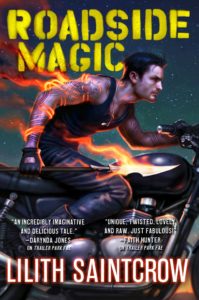Greetings, Evil Doers! We’re hitting the end of the ELEW anniversary celebration. Today I bring you a guest post from our Bad Horse of the ELEW, Patron Saint of Evil Writers everywhere, Lilith Saintcrow!
ELEW: You manage to juggle two if not three projects at once, often putting in word count on all of them daily, and in different genres at that. How…how do you accomplish such SORCERY?
Three Ms and Pointy Things
 My response, when Skyla told me the ELEW was having its fifth anniversary, was something along the lines of “Christ has it been that long? I’m old.” Which is pretty much my response to everything, now that my kids are both teenagers.
My response, when Skyla told me the ELEW was having its fifth anniversary, was something along the lines of “Christ has it been that long? I’m old.” Which is pretty much my response to everything, now that my kids are both teenagers.
I am aware of very few groups whose bullshit quotients are low enough for my tolerance. ELEW has always been one of that small number ever since its inception, and I couldn’t be prouder to be their Bad Horse.
“How do you juggle projects in different genres?”
Answer: sort of how a lizard juggles chainsaws. Carefully, but without overthinking, and confident that amputations are not the end of the road.
I like the freefall-feeling of shifting from a tongue-in-cheek schoolmarm-and-sheriff zombie Western to a bloody, terrifying scene where an alt-historical Victorian detective has a heart attack in the sewers of a nasty, carnivorous London. I like shifting between horror and romance, hilarious laughter and stark terror.
Parenthood, you could say, has given me a taste for such things.
That being said, here are three things that help me perform that mental gear-shift (hopefully) without running headlong into a brick wall. (Much.)
- Music. Even if you can’t write with music playing in the background, there’s nothing wrong with blasting a mood tune for a chorus or so to help you get into the right mindframe, turning it off mid-beat, and letting it carry you into the scene. For example, I can go from a lovely romantic song about longing while writing a romance’s HEA to a pulse-pounding shoot-em-up combat soundtrack for a gritty urban fantasy combat scene. You could also watch a favourite movie scene in the same genre you’re switching into, but on that path lies danger—you can easily get sucked into a YouTube rabbit hole and mistake that for actual writing effort. Have a plan and a time limit before you click “play,” in either case.
- Motion. Get up and move around a bit. Walk a few steps. Close your eyes, and imagine how you’d be moving if you were in the project you’re switching to. Is your protagonist hurried, worried, wounded, happy? Imagine that feeling, get it really clear inside your skull, then walk back to your writing with that feeling. I call this “a kinetic cue”, somewhat similar to blocking out combat scenes before writing them down. The physical movement helps you slide between one story and the next, providing both a sharp border to halt the first and a greased ramp to slip into the second.
- Mouthing. If you can’t get up, don’t despair. Settle in your chair, or at your standing desk. Then, quietly or loudly as you please, speak some of the dialogue from the project you want to slip back into just as your character would say it. Don’t worry about sounding weird—you’re a writer, this sort of thing is expected. If you absolutely can’t make any noise, just mouth the words. (Bonus: wear earbuds or headphones so people around you assume you’re just jamming to a beat.) Move your face how your character’s face would move. Get into it, and let it swing the door into the project you’re switching to.
 The commonality in all these strategies is hacking your mental and emotional state to get you reliably in sync not with the project you’ve just finished working on, but the one you want to work on next. You can use just one, or all three at once—I have often walked down my hall blasting a badass song while shouting a character’s lines just to help the gearshift inside my head drop into place.
The commonality in all these strategies is hacking your mental and emotional state to get you reliably in sync not with the project you’ve just finished working on, but the one you want to work on next. You can use just one, or all three at once—I have often walked down my hall blasting a badass song while shouting a character’s lines just to help the gearshift inside my head drop into place.
This brings up one other quick thing I wish more writers took into account: that mental and emotional energy you’re using to write, to get yourself into it? You have a finite amount of it each day, which means you must shepherd and guard it carefully. Working on more than one book at a time, often in wildly different genres, means I have to be vigilant and absolutely ruthless when it comes to guarding my writing time/energy.
Yes, that means I sometimes have to be a bitch about it. Quelle surprise.
Even if you only have ten minutes a day to work, those ten minutes are yours, and deserve to be guarded like that three-headed beast guards the gates of Hades—with a lot of teeth.
And if there’s one thing I know you ELEW types have in spades, it’s determination and sharp pointies.
Over and out.
—–
Thank you, Bad Horse! Writer types who want to write for a living, you’ll do well to listen to her.
Lili’s most recent series is Ragged & Gallow, which you can learn more about (and buy copies of!) here.
When all else fails, name your itty-bitty turtle Cerberus and pretend time-sucking tasks/people are the worms she eats. Once again, Bad Horse has sound advice. *hat tip*
Love the comments on music, motion, and mouthing. And it is true. When I am writing for work, I do all these things instinctively.
*bowing on hands and knees* I’m not worthy.
;D You are an amazing influence! Thank you Lilith!